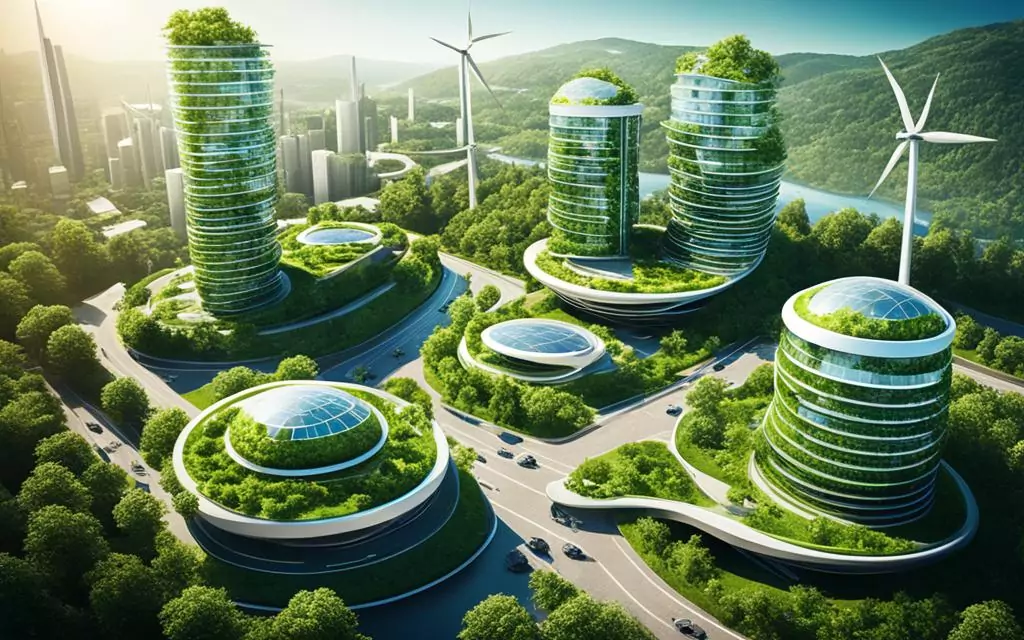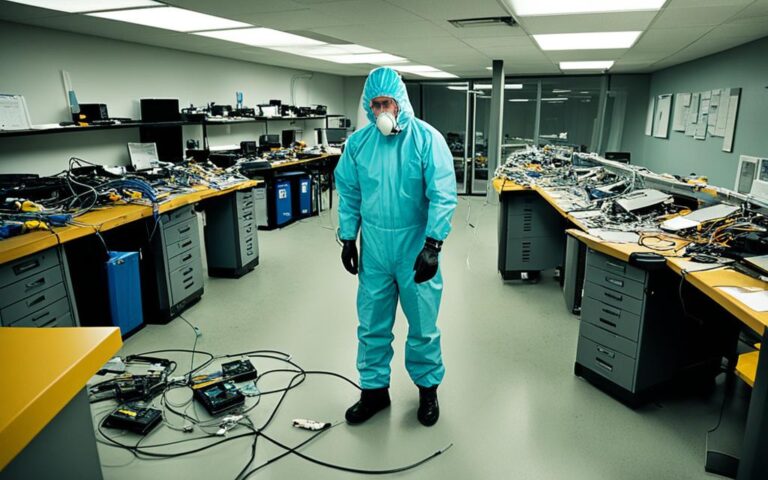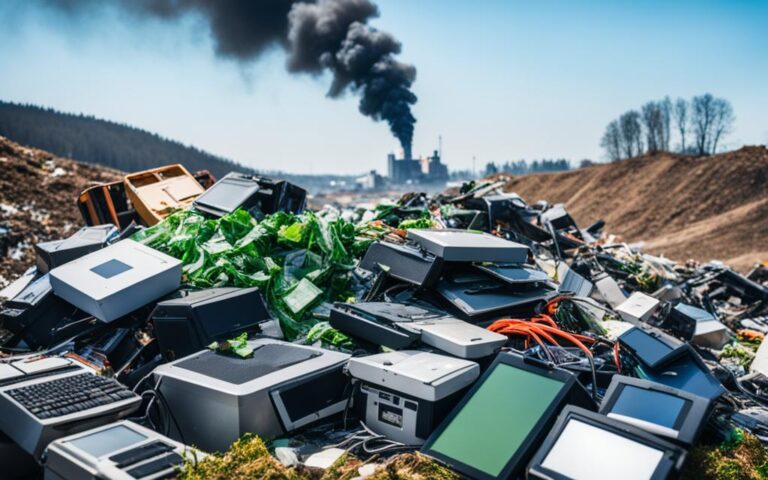The Role of Recycling in the Tech Industry’s Green Future
Recycling plays a crucial role in promoting environmental sustainability by conserving resources, reducing waste, and minimizing pollution. As the tech industry continues to expand and innovate, it is essential to consider the implications of its growth on the environment. Embracing recycling practices is vital to achieving a green future in the tech industry.
The future of recycling in the tech industry is driven by technological advancements and innovations, a shift towards sustainable and circular economies, and the potential for recycling in emerging industries. These trends and developments in recycling are pivotal in ensuring that the tech industry’s growth remains sustainable and environmentally responsible.
The UK’s evolving industry landscape presents opportunities to integrate recycling practices and establish a robust recycling infrastructure. By implementing effective recycling systems, the tech industry can reduce its carbon footprint and contribute to the creation of a cleaner and greener future.
Historical Background of Recycling
Recycling has a rich history that dates back centuries, with ancient civilizations like the Egyptians and Romans repurposing materials such as metal, glass, and textiles. These resourceful societies recognized the value in reusing materials and minimizing waste, reflecting early efforts towards sustainability.
However, it was during the 19th and 20th centuries that the modern recycling movement gained significant momentum. The rise of industrialization and mass production created unprecedented amounts of waste, sparking a need for efficient waste management strategies.
An important milestone in the history of recycling was the establishment of the first municipal recycling program in New York City in the 1890s. This groundbreaking initiative set the stage for the widespread adoption of recycling practices across the United States and later, around the world.
Throughout the years, recycling has been shaped by significant events and the shared commitment to environmental conservation. One such event is the creation of Earth Day in 1970, which raised awareness of the urgent need to protect our planet and prompted individuals, communities, and governments to take action.
Another critical development in recycling was the introduction of recycling symbols and labeling systems. These standardized symbols, such as the familiar three-arrow symbol, help consumers identify recyclable materials and contribute to proper waste sorting.
The historical background of recycling reveals the evolutionary journey from the resourcefulness of ancient civilizations to the widespread adoption of recycling practices in the modern era. It provides a foundation for understanding the importance of recycling in achieving a sustainable future.
“The historical background of recycling reveals the evolutionary journey from the resourcefulness of ancient civilizations to the widespread adoption of recycling practices in the modern era.”
Ancient Recycling Practices
Ancient civilizations such as the Egyptians and Romans were pioneers in repurposing materials. They recognized the value of preserving and reusing resources, which allowed them to minimize waste and make the most of available materials.
Early Industrialization and Municipal Recycling
With the advent of industrialization and mass production, the need for effective waste management became apparent. The establishment of the first municipal recycling program in New York City in the late 19th century marked a significant milestone in the development of modern recycling practices.
Key Milestones and Events
Over time, key milestones and events have shaped the evolution of recycling. Earth Day, created in 1970, raised global awareness about environmental issues and inspired a renewed commitment to recycling and sustainability. The introduction of recycling symbols and labeling systems standardized recycling practices and improved waste sorting.
| Ancient Civilizations | Egyptians and Romans repurposed materials to minimize waste and make efficient use of available resources. |
|---|---|
| 19th and 20th Centuries | Rise of industrialization and mass production increased waste volumes and highlighted the need for effective waste management strategies. |
| 1890s | Establishment of the first municipal recycling program in New York City paved the way for widespread adoption of recycling practices. |
| 1970 | Creation of Earth Day raised global awareness about environmental conservation and sustainability. |
| Recycling Symbols and Labeling Systems | Introduction of standardized symbols and labeling systems improved waste sorting and consumer awareness. |
Technological Advancements and Innovations in Recycling
Technological advancements in the field of recycling have revolutionized the industry, leading to significant improvements in efficiency, effectiveness, and sustainability. These innovations have paved the way for a greener future in the tech industry, where recycling plays a crucial role in minimizing waste and conserving resources.
One notable advancement is the development of automated sorting systems, which have revolutionized the recycling process. These systems use state-of-the-art sensors, robotics, and artificial intelligence to accurately identify and separate different types of recyclable materials. By automating this labor-intensive task, these systems have greatly increased recycling rates and reduced contamination, ensuring that valuable resources are recovered and reused.
Moreover, advanced recycling technologies have emerged, allowing for the efficient recycling of complex and mixed materials. One such technology is chemical recycling, which utilizes chemical processes to break down and transform waste materials into high-quality resources. This method is particularly effective in handling materials that are challenging to recycle using traditional mechanical means.
These technological advancements and innovations have not only enhanced the recycling industry’s effectiveness but have also opened up new possibilities for recycling in the tech industry. By implementing these advanced recycling technologies, the tech industry can minimize its environmental footprint and contribute to the creation of a circular economy.
The Benefits of Technological Advancements in Recycling
There are several key benefits associated with the integration of technology in the recycling process:
- Increased recycling rates: The automation provided by sorting systems has significantly improved recycling efficiency, resulting in higher recycling rates and diverting more waste from landfills.
- Reduced contamination: Automated sorting systems ensure that recyclables are efficiently separated, reducing the risk of contamination, and ensuring the production of high-quality recycled materials.
- Improved resource recovery: The advanced recycling technologies enable the recovery of a wider range of materials, promoting resource conservation and reducing the need for raw material extraction.
- Enhanced sustainability: By incorporating these technological advancements, the recycling industry can contribute to the shift towards sustainable and circular economies, where resources are continuously reused, reducing the demand for virgin materials.
Overall, technological advancements and innovations in recycling have revolutionized the industry, providing the tools and methods needed to achieve a greener future in the tech industry. By embracing these advancements, we can move towards a more sustainable and circular economy, where the valuable resources within our waste are effectively recovered and reused.
Shift towards Sustainable and Circular Economies
The future of recycling hinges on the transition towards sustainable and circular economies. With a renewed emphasis on reducing waste and maximizing resource recovery, recycling practices are becoming increasingly integrated into product design and lifecycle. This integration allows for the reuse or recycling of materials at the end of their lifespan, closing the loop and creating a regenerative system where resources are continuously utilized.
By adopting sustainable and circular economies, businesses and industries can contribute to the achievement of a green future in the tech industry. These economies prioritize the efficient use of resources, minimizing environmental impact, and promoting long-term sustainability.
Product Design and Lifecycle Integration
In sustainable and circular economies, product design plays a vital role in enabling resource recovery through recycling. Designers are encouraged to incorporate recyclability into their products’ design from the outset. This involves using materials that are easily recycled, reducing the use of hazardous substances, and designing products with disassembly and separation in mind.
Integrating recycling into the lifecycle of products ensures that materials can be recovered and reintroduced into the manufacturing process. Through strategies such as take-back programs and extended producer responsibility, businesses can play an active role in facilitating the recycling and recovery of their products.
The Benefits of Circular Economies
Circular economies offer numerous benefits for both businesses and the environment. By keeping resources in use for longer periods, circular economies reduce the demand for new raw materials and the associated environmental impacts of extraction. This helps to conserve natural resources and minimize energy consumption, contributing to the overall sustainability of the tech industry.
Additionally, circular economies create opportunities for innovation and job creation, driving economic growth in the context of sustainable development. By transitioning towards circular economies, businesses can tap into new market opportunities, develop more resilient supply chains, and foster a competitive advantage in a rapidly changing world.
| Benefits of Sustainable and Circular Economies | Examples |
|---|---|
| Reduced environmental impact | – Recycling materials reduces the need for extraction and production of new resources – Minimizes waste sent to landfills, reducing greenhouse gas emissions |
| Cost savings | – Recycling and reusing materials can lower production costs – Minimizes the need for raw material purchase and disposal expenses |
| Job creation and economic growth | – Development of recycling infrastructure and technologies creates employment opportunities – Circular economies drive innovation and attract investment |
| Improved resource management | – Efficient use of resources minimizes waste and promotes resource conservation – Enables the recovery of valuable materials for future use |
The shift towards sustainable and circular economies in the tech industry is essential for achieving a green future. By embracing recycling, product design integration, and resource recovery, businesses can play a pivotal role in creating a more sustainable and environmentally responsible industry.
Potential for Recycling in Emerging Industries
As electric vehicles and renewable energy gain momentum in the tech industry, the need for recycling solutions for their components and materials becomes crucial. The fast-growing market for electric vehicles demands efficient recycling practices to manage the disposal of batteries and other complex materials. Similarly, the renewable energy sector, with its reliance on solar panels and other renewable technologies, requires specialized recycling infrastructure.
Recycling in emerging industries like electric vehicles and renewable energy presents both challenges and opportunities. The complex makeup of electric vehicle batteries and the integration of various components in renewable energy technologies require innovative recycling processes tailored to tackle these specific waste streams. Developing these specialized recycling solutions enables responsible management and resource recovery.
By addressing the recycling needs of emerging industries, we contribute to a greener future in the tech industry. The responsible management of waste streams in electric vehicles and renewable energy technologies reduces the environmental impact of these sectors, ensures resource conservation, and promotes the circular economy. Building a comprehensive recycling infrastructure is crucial for meeting the sustainability goals set by the tech industry and creating a more environmentally conscious future.
FAQ
How does recycling contribute to a green future in the tech industry?
Recycling plays a crucial role in promoting environmental sustainability by conserving resources, reducing waste, and minimizing pollution. By recycling materials, the tech industry can reduce its carbon footprint and contribute to a greener future.
What is the history of recycling?
Recycling has a rich history that dates back centuries. Ancient civilizations like the Egyptians and Romans repurposed materials such as metal, glass, and textiles. The modern recycling movement gained momentum in the 19th and 20th centuries with the rise of industrialization and mass production.
What are some technological advancements in recycling?
Technological advancements have greatly improved the efficiency and effectiveness of recycling processes. Innovations such as automated sorting systems and advanced recycling technologies have increased recycling rates and reduced contamination. These advancements also enable new recycling methods, such as chemical recycling, which can handle complex and mixed materials.
How does recycling fit into sustainable and circular economies?
The future of recycling lies in the shift towards sustainable and circular economies. Sustainable economies aim to reduce waste and maximize resource recovery by integrating recycling into product design and lifecycle. By closing the loop, the circular economy creates a regenerative system where resources are continuously reused.
What is the potential for recycling in emerging industries?
Emerging industries like electric vehicles and renewable energy present opportunities for recycling their components and materials. Recycling electric vehicle batteries, solar panels, and other complex materials is essential for responsible waste management. Developing specialized recycling infrastructure and processes is crucial to support the growth of these industries and contribute to a green future in the tech industry.















